Wild guinea pigs forage on grasses, plants, vegetables and crops. To help your pet piggy pals stay healthy and happy, you should choose a guinea pig diet that mimics what they would naturally eat in the wild.
Entirely vegetarian, these small herbivores have very delicate digestive systems and need high levels of fibre in their diet to keep their gut moving. Feeding lots of high quality feeding hay, such as Burgess Excel, is the best way to ensure your pet guinea pigs are getting enough fibre in their diet. Munching on tasty hay also helps to keep their ever-growing teeth in good shape.
Just like us, guinea pigs aren’t able to make their own vitamin C, and need to get a daily dose in their food or they can suffer all sorts of health issues. Providing them with guinea pig nuggets that contain vitamin C, along with a small portion of guinea-pig safe fresh greens, will keep their vitamin C levels topped up.
What is the best food for guinea pigs?
When considering how much and how often to feed your guinea pigs, it’s a good idea to follow a feeding plan. Your guinea pigs’ food chart should feature:
- 85% – 90% unlimited grazed grass (not grass cuttings) or high quality feeding hay (not bedding hay, which may have poor nutritional value). As a guide, provide each piggy with at least their own body size in fresh feeding hay every day.
- A small handful of guinea pig-safe leafy greens, vegetables and herbs – around a teacup-sized amount a day per guinea pig. Greens and veg high in vitamin C are especially good.
- Pelleted guinea pig food – around one egg cup a day per guinea pig. Guinea pig nuggets help ensure your piggies get all the vital vitamins and minerals they need. You can split their daily ration between morning and evening feeds.
You can also include some yummy, healthy guinea pig treats to add enrichment. These are great for hand feeding, helping you to build your bond with your guinea pig pals.
Your guinea pigs must also have access to plenty of fresh water at all times, supplied in pet drinking bottles which feature a solid sipper tube.
What vegetables can guinea pigs eat?
Wondering what to feed guinea pigs when it comes to veg? There are all sorts of safe veggies including:
- Baby corn on cob
- Bell peppers
- Carrot tops
- Cauliflower leaves and stalks
- Celery leaves
- Courgette (and flowers)
- Green beans
- Peas (leaves and pods)
- Rocket
- Savoy cabbage
- Spring greens
- Watercress
- Tomato – but NOT the leaves/vine as these are poisonous.
PDSA provide a comprehensive list of recommended vegetables.
What fruits can guinea pigs eat?
Guinea pigs don’t naturally eat fruit, but you can give small amounts as an occasional treat. Fruit is high in sugar, which can cause obesity.
Grapes, for example, have a very high sugar content – and can also be a choking hazard. If you do decide to feed your guinea pigs grapes, choose only seedless varieties and offer them just a couple, sliced in two, once or twice a week.
Safe fruits for guinea pigs include:
- Apple (not the pips because they’re poisonous)
- Banana
- Blueberry
- Cherry
- Kiwi
- Melon
- Pear
- Plum
- Squash
- Strawberry
What wild flower forage and herbs are safe for guinea pigs?
Can guinea pigs eat dandelion?
Can guinea pigs eat rabbit food?
Quick tip
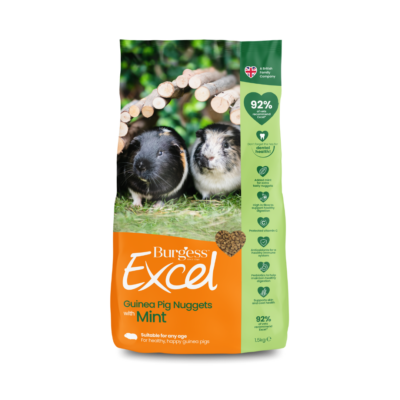
Excel Guinea Pig Nuggets with Mint
What foods should guinea pigs avoid?
There are a few foods that guinea pigs shouldn’t be given. These include:
- Guinea pig muesli – Muesli-based guinea pig diets encourage selective feeding, where they eat high starch/sugar components of the muesli while rejecting the more fibrous pellets. This means they won’t be getting all the nutrition they need.
- Sweet treats – Colourful guinea pig treats are often very high in sugar, and bad for your guinea pigs’ teeth and tummy.
- Human food – High carb bread, pasta and crackers can cause digestive problems. Chocolate and dairy products are particularly dangerous and citrus fruit can upset their sensitive tummies.
- Grass cuttings– Guinea pigs should be given unlimited access to steadily graze on fresh grass, just as they would in the wild. But a pile of grass cuttings can be very harmful to if included in a guinea pigs’ diet.
- Toxic flowers – Avoid buttercups, daffodils, poppies and tulips.
- Unsuitable fruit and veg– Vegetables to avoid, as they are poisonous to guinea pigs, include potatoes and potato skin, onion and related vegetables, garlic, mushrooms, chives and avocado. Light-coloured lettuce varieties are high in water, have very little nutritional value and will just give your guinea pigs the runs. Also steer clear of rhubarb – it’s poisonous to animals if eaten raw.
- Nuts and seeds– All nuts are high in fat not fibre and will give your guinea pigs extremely uncomfortable indigestion.
If you’re not sure whether something’s safe for your guinea pigs to eat, it’s best avoided.
Guinea pig feeding plan
What's the best way of feeding guinea pigs?
Why choose Burgess Excel for your guinea pigs' food?
Burgess Excel guinea pig food is made using only the highest quality ingredients at our very own factory in Yorkshire.
Our high-quality feeding hay, and guinea pig nuggets provide your pals with all the essential nutrients, including beneficial fibre, vitamins and minerals.
Plus, it’s easy to order online, with free delivery over £25.
The Excel Feeding Plan
Following our Excel feeding plan will ensure that your guinea pigs get the correct balance of fibre, vitamins and minerals. 85-90% of a guinea pigs’ diet should be high quality, dust extracted feeding hay, such . Supplement this with a small portion of Excel nuggets, the occasional Excel nature treat, a small handful of fresh greens and plenty of fresh water.
Guinea pigs are herbivores who live on a plant-based diet. However, we like to call them ‘fibrevores’ as fibre is by far the most important part of their diet and is essential for their gut and dental health.
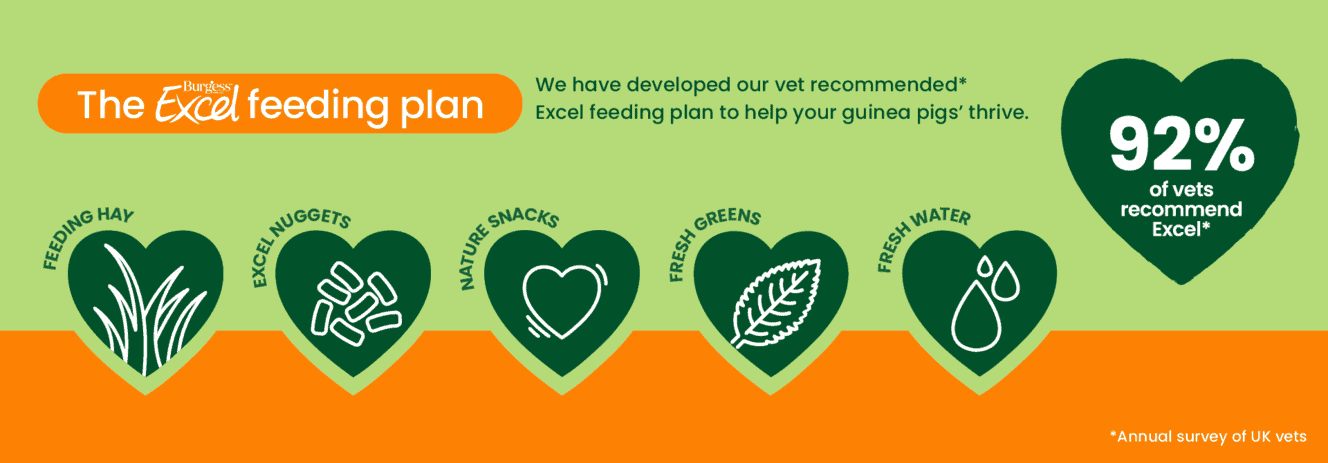
Types of Fibre
Guinea pigs always need to keep their digestive systems busy with a mix of two kinds of fibre moving through the gut. These two types of fibre are called digestible fibre and indigestible fibre. Guinea pigs get this fibre mainly from good quality hay. We’d recommend Burgess Excel Feeding Hay.
Guinea pigs can’t get enough nutrition from fibre when it passes through their gut the first time. To help them get all the nutrients they need, guinea pigs excrete caecotrophs. These are soft, sticky-type droppings that they then re-eat to digest the rest of the vital nutrients.
Guinea pigs can’t make their own vitamin C so they need extra in their diet. Vitamin C is important for healthy skin, joints and blood vessels. Burgess Excel has been specially formulated to have all the vitamins your guinea pigs need, including a protected form of vitamin C. Along with a handful of fresh greens a day, you can make sure they are getting enough vitamin C.
Digestible fibre is moved up an organ called the caecum, which acts like a giant appendix.
Good bacteria in the caecum ferment the fibre to make it easy for your guinea pigs to digest. This is then excreted as sticky droppings, called caecotrophs. Guinea pigs then re-eat the caecotrophs so they can absorb the rest of the essential nutrients when they pass through a second time.
Beneficial Fibre
If guinea pigs don’t get the right amounts of both digestible and indigestible fibre, it can rapidly lead to serious health problems. At Excel, we call the correct ratio of these two types of fibre ‘Beneficial Fibre’.
Sticking to The Excel Feeding Plan will ensure your guinea pigs get the right amounts of fibre in their diet. The Excel Feeding Plan was developed in conjunction with one of the world’s leading small-animal vets, to provide a perfect daily balance of fibre and nutrition.
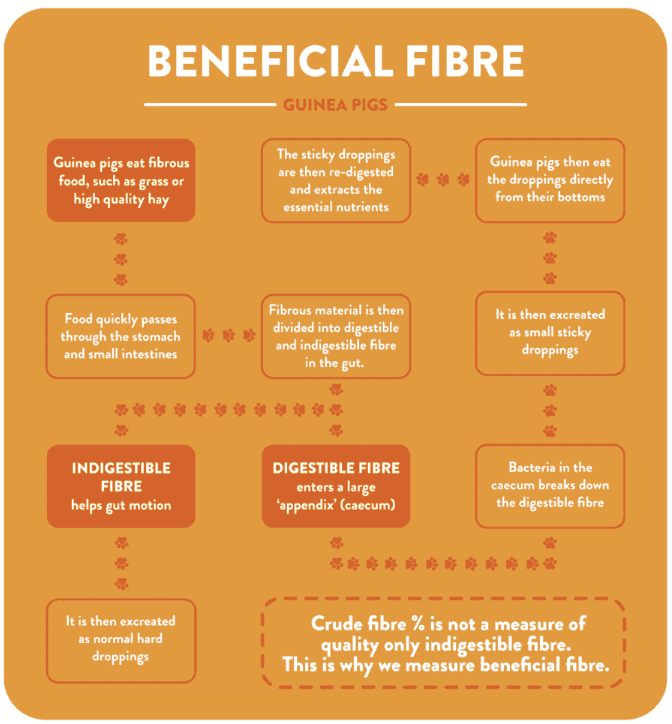
DON'T FORGET THE HAY
Our Burgess Excel Range

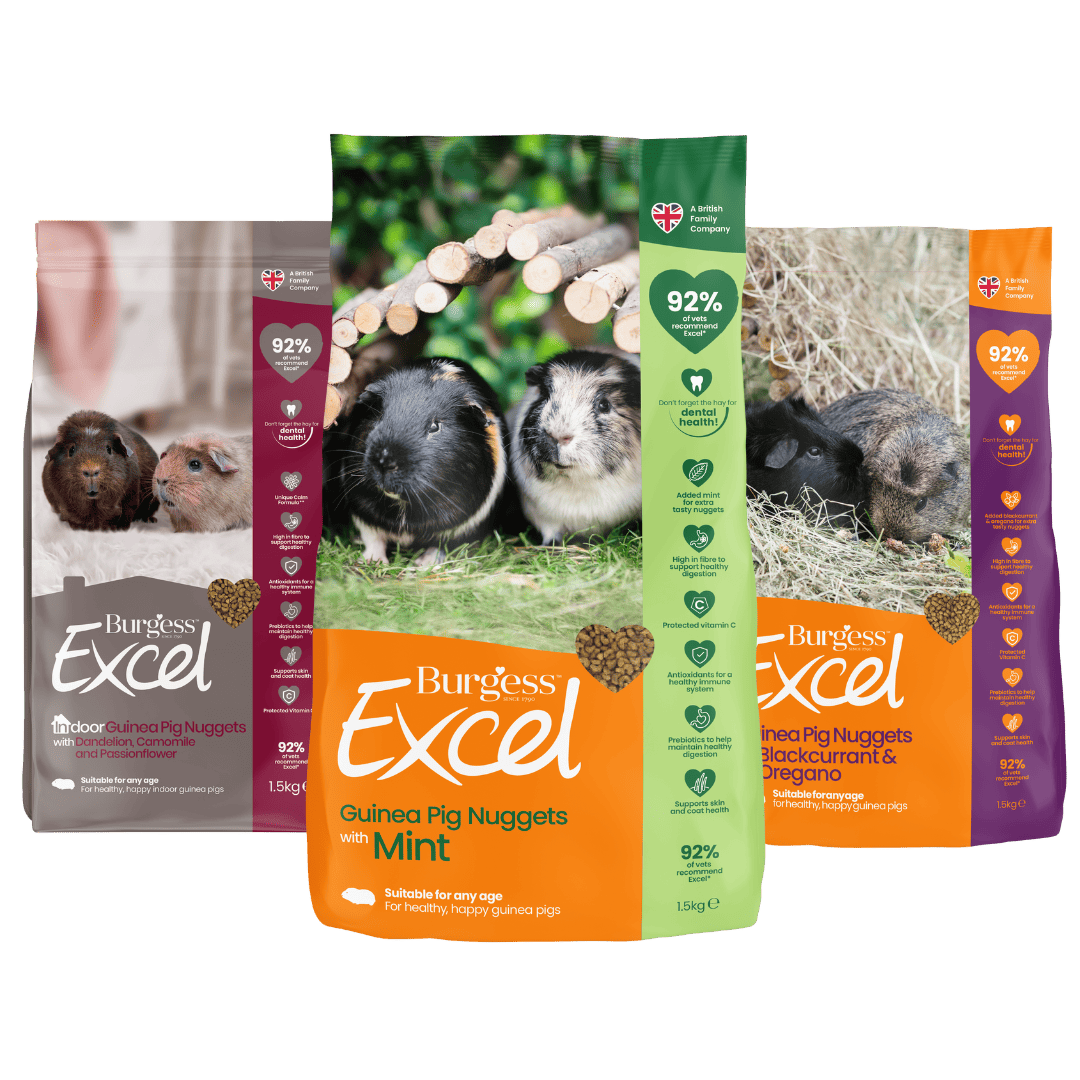



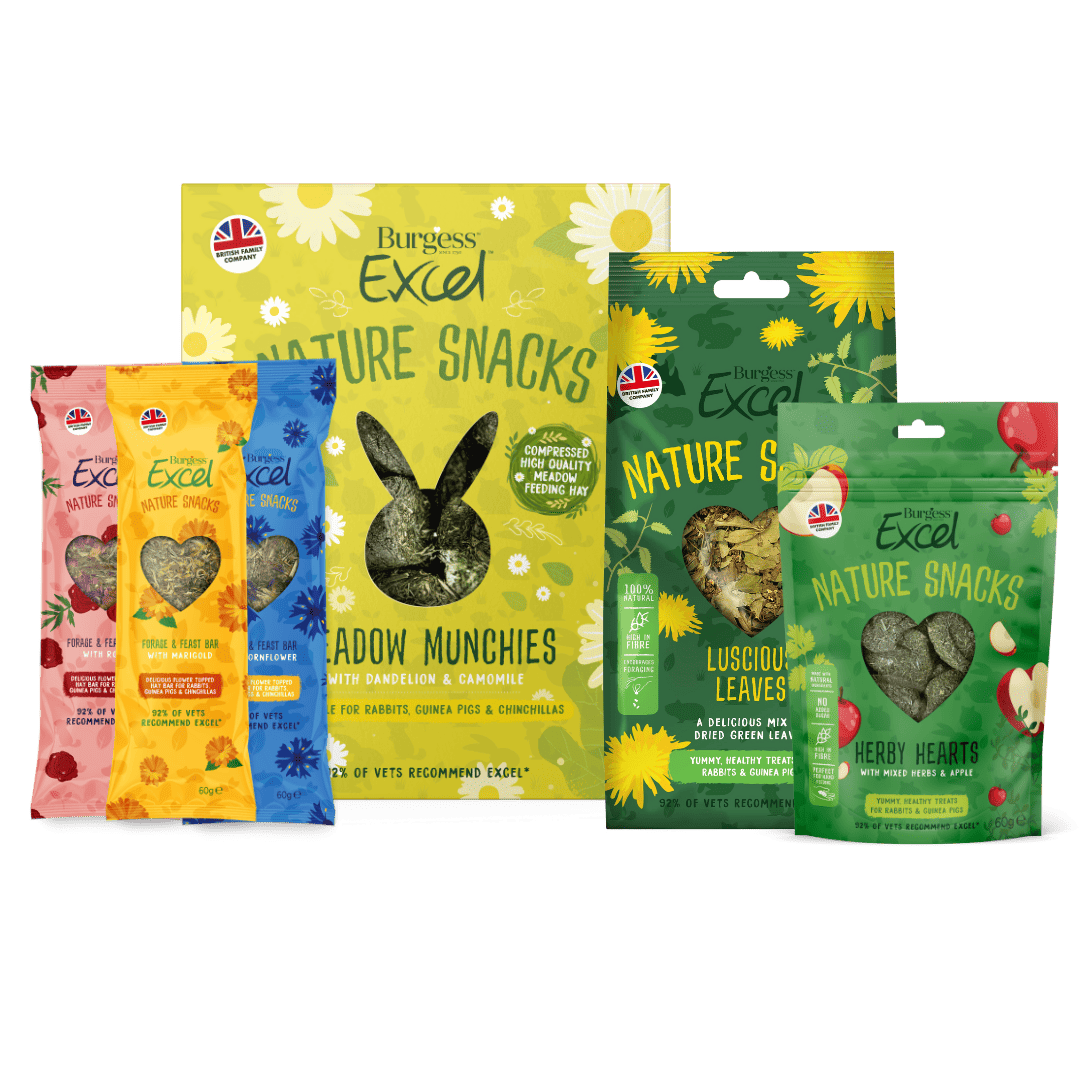

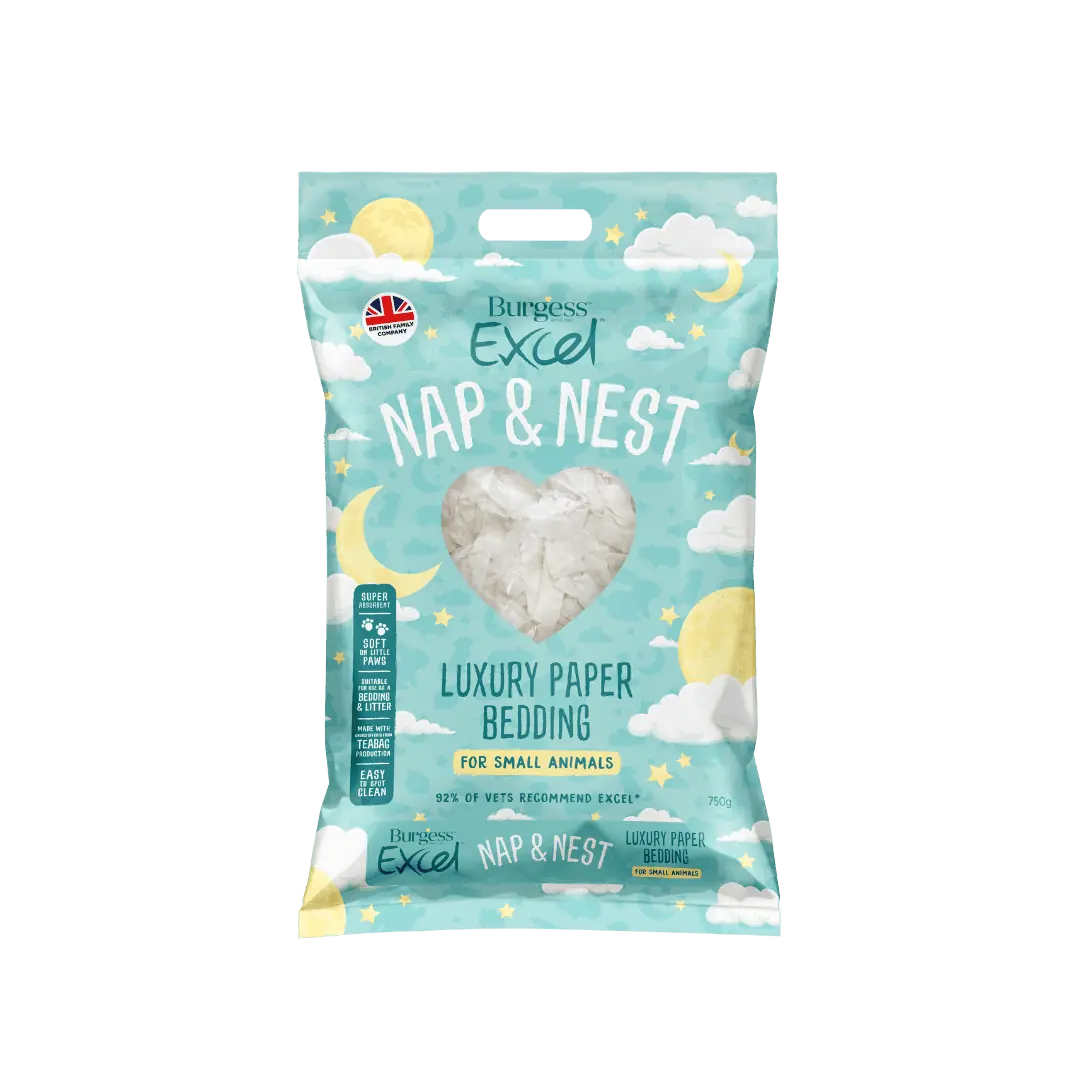
Transitioning to Burgess Excel nuggets

Do you need more advice?
To help you find the right food for your pet have a look at our product range.
You can get in touch with our customer care team who will respond in 3-5 working days. Our dedicated team of pet experts will help you make the right choice.
If you should have any concerns about the health of your pet, always consult a vet.















